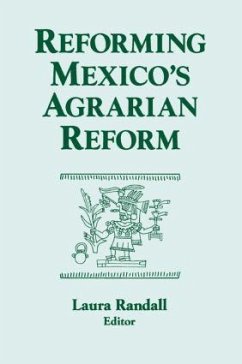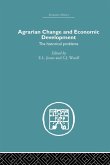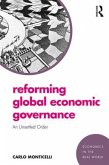Laura Randall
Reforming Mexico's Agrarian Reform
Laura Randall
Reforming Mexico's Agrarian Reform
- Broschiertes Buch
- Merkliste
- Auf die Merkliste
- Bewerten Bewerten
- Teilen
- Produkt teilen
- Produkterinnerung
- Produkterinnerung
This work provides a survey and analysis of Mexico's agrarian reform, covering topics such as the agricultural provisions of NAFTA. The book also discusses the events in Chiapas that are crucial to Mexico's current political situation and the implications of reform for US-Mexican trade.
Andere Kunden interessierten sich auch für
![Agrarian Problems in the Sixteenth Century and After Agrarian Problems in the Sixteenth Century and After]() Eric KerridgeAgrarian Problems in the Sixteenth Century and After63,99 €
Eric KerridgeAgrarian Problems in the Sixteenth Century and After63,99 €![Agrarian Angst and Rural Resistance in Contemporary Southeast Asia Agrarian Angst and Rural Resistance in Contemporary Southeast Asia]() Agrarian Angst and Rural Resistance in Contemporary Southeast Asia19,99 €
Agrarian Angst and Rural Resistance in Contemporary Southeast Asia19,99 €![Structural Transformation and Agrarian Change in India Structural Transformation and Agrarian Change in India]() Goran DjurfeldtStructural Transformation and Agrarian Change in India59,99 €
Goran DjurfeldtStructural Transformation and Agrarian Change in India59,99 €![Agrarian Change and Economic Development Agrarian Change and Economic Development]() Agrarian Change and Economic Development44,99 €
Agrarian Change and Economic Development44,99 €![Reforming Global Economic Governance Reforming Global Economic Governance]() Carlo MonticelliReforming Global Economic Governance59,99 €
Carlo MonticelliReforming Global Economic Governance59,99 €![The Agrarian Indian Communities of Highland Bolivia The Agrarian Indian Communities of Highland Bolivia]() George McCutchen McBrideThe Agrarian Indian Communities of Highland Bolivia14,99 €
George McCutchen McBrideThe Agrarian Indian Communities of Highland Bolivia14,99 €![India; Or, Facts Submitted to Illustrate the Character and Condition of the Native Inhabitants: With Suggestions for Reforming the Present System of G India; Or, Facts Submitted to Illustrate the Character and Condition of the Native Inhabitants: With Suggestions for Reforming the Present System of G]() Robert RickardsIndia; Or, Facts Submitted to Illustrate the Character and Condition of the Native Inhabitants: With Suggestions for Reforming the Present System of G34,99 €
Robert RickardsIndia; Or, Facts Submitted to Illustrate the Character and Condition of the Native Inhabitants: With Suggestions for Reforming the Present System of G34,99 €-
-
-
This work provides a survey and analysis of Mexico's agrarian reform, covering topics such as the agricultural provisions of NAFTA. The book also discusses the events in Chiapas that are crucial to Mexico's current political situation and the implications of reform for US-Mexican trade.
Produktdetails
- Produktdetails
- Verlag: Routledge
- Seitenzahl: 360
- Erscheinungstermin: 28. Februar 1996
- Englisch
- Abmessung: 229mm x 152mm x 19mm
- Gewicht: 522g
- ISBN-13: 9781563246449
- ISBN-10: 1563246449
- Artikelnr.: 21830977
- Herstellerkennzeichnung
- Libri GmbH
- Europaallee 1
- 36244 Bad Hersfeld
- gpsr@libri.de
- Verlag: Routledge
- Seitenzahl: 360
- Erscheinungstermin: 28. Februar 1996
- Englisch
- Abmessung: 229mm x 152mm x 19mm
- Gewicht: 522g
- ISBN-13: 9781563246449
- ISBN-10: 1563246449
- Artikelnr.: 21830977
- Herstellerkennzeichnung
- Libri GmbH
- Europaallee 1
- 36244 Bad Hersfeld
- gpsr@libri.de
Randall, Laura
1. Introduction 2. Opening Remarks Panel 1: Introduction to Land Reform 3.
Introduction to Panel I 4. The Agrarian Policies and Ideas of the
Revolutionary Mexican Factions Led by Emiliano Zapata, Pancho Villa, and
Venustiano Carranza 5. Mexican Land Reform, 1934-91: Success or Failure? 6.
Recent Changes in the Mexican Constitution and Their Impact on the Agrarian
Reform 7. Panel I. Introduction to Land Reform: Discussion Panel II: The
Economic Consequences of Land Reform: Who Gains, Who Loses? 8. Introduction
to Panel II 9. Ejido Sector Reforms: From Land Reform to Rural Development
10. An Opinion Survey in the Countryside-1994 11. Appropriate Agricultural
Credit: A Missing Piece of Agrarian Reform in Mexico 12. Panel II. The
Economic Consequences of Land Reform: Who Gains, Who Loses? Discussion
Panel III: Land Reform, Agrarian Organizations, and the Structure of
Mexican Politics 13. Introduction to Panel III 14. Impact of Reforms to
Article 27 on Chiapas: Peasant Resistance in the Neoliberal Public Sphere
15. A Persistent Rural Leviathan 16. National Electoral Choices in Rural
Mexico 17. Panel III. Land Reform, Agrarian Organizations, and the
Structure of Mexican Politics: Discussion Panel IV: Land Use and the
Environment 18. Of Land Tenure, Forests, and Water: The Impact of the
Reforms to Article 27 on the Mexican Environment 19. Campesinos, Water, and
the State: Different Views of La Transferencia 20. Reforming Forests: From
Community Forests to Corporate Forestry in Mexico 21. The Ecological
Consequences of the 1992 Agrarian Law of Mexico 22. Panel IV. Land Use and
the Environment: Discussion Panel V: Land Reform, Property Rights, Gender,
and Migration 23. What's at Stake? The Reform of Agrarian Reform in Mexico
24. The Changing Configuration of Property Rights Under Ejido Reform 25.
Too Little, Too Late? The Impact of Article 27 on Women in Oaxaca 26.
U.S.-Bound Migration and the Future of the Ejido: Changing Pragmatic
Commitments to the Ejido Among Different Cohorts of Villagers in a Hamlet
in Michoacan 27. Panel V. Land Reform, Property Rights, Gender, and
Migration: Discussion
Introduction to Panel I 4. The Agrarian Policies and Ideas of the
Revolutionary Mexican Factions Led by Emiliano Zapata, Pancho Villa, and
Venustiano Carranza 5. Mexican Land Reform, 1934-91: Success or Failure? 6.
Recent Changes in the Mexican Constitution and Their Impact on the Agrarian
Reform 7. Panel I. Introduction to Land Reform: Discussion Panel II: The
Economic Consequences of Land Reform: Who Gains, Who Loses? 8. Introduction
to Panel II 9. Ejido Sector Reforms: From Land Reform to Rural Development
10. An Opinion Survey in the Countryside-1994 11. Appropriate Agricultural
Credit: A Missing Piece of Agrarian Reform in Mexico 12. Panel II. The
Economic Consequences of Land Reform: Who Gains, Who Loses? Discussion
Panel III: Land Reform, Agrarian Organizations, and the Structure of
Mexican Politics 13. Introduction to Panel III 14. Impact of Reforms to
Article 27 on Chiapas: Peasant Resistance in the Neoliberal Public Sphere
15. A Persistent Rural Leviathan 16. National Electoral Choices in Rural
Mexico 17. Panel III. Land Reform, Agrarian Organizations, and the
Structure of Mexican Politics: Discussion Panel IV: Land Use and the
Environment 18. Of Land Tenure, Forests, and Water: The Impact of the
Reforms to Article 27 on the Mexican Environment 19. Campesinos, Water, and
the State: Different Views of La Transferencia 20. Reforming Forests: From
Community Forests to Corporate Forestry in Mexico 21. The Ecological
Consequences of the 1992 Agrarian Law of Mexico 22. Panel IV. Land Use and
the Environment: Discussion Panel V: Land Reform, Property Rights, Gender,
and Migration 23. What's at Stake? The Reform of Agrarian Reform in Mexico
24. The Changing Configuration of Property Rights Under Ejido Reform 25.
Too Little, Too Late? The Impact of Article 27 on Women in Oaxaca 26.
U.S.-Bound Migration and the Future of the Ejido: Changing Pragmatic
Commitments to the Ejido Among Different Cohorts of Villagers in a Hamlet
in Michoacan 27. Panel V. Land Reform, Property Rights, Gender, and
Migration: Discussion
1. Introduction 2. Opening Remarks Panel 1: Introduction to Land Reform 3.
Introduction to Panel I 4. The Agrarian Policies and Ideas of the
Revolutionary Mexican Factions Led by Emiliano Zapata, Pancho Villa, and
Venustiano Carranza 5. Mexican Land Reform, 1934-91: Success or Failure? 6.
Recent Changes in the Mexican Constitution and Their Impact on the Agrarian
Reform 7. Panel I. Introduction to Land Reform: Discussion Panel II: The
Economic Consequences of Land Reform: Who Gains, Who Loses? 8. Introduction
to Panel II 9. Ejido Sector Reforms: From Land Reform to Rural Development
10. An Opinion Survey in the Countryside-1994 11. Appropriate Agricultural
Credit: A Missing Piece of Agrarian Reform in Mexico 12. Panel II. The
Economic Consequences of Land Reform: Who Gains, Who Loses? Discussion
Panel III: Land Reform, Agrarian Organizations, and the Structure of
Mexican Politics 13. Introduction to Panel III 14. Impact of Reforms to
Article 27 on Chiapas: Peasant Resistance in the Neoliberal Public Sphere
15. A Persistent Rural Leviathan 16. National Electoral Choices in Rural
Mexico 17. Panel III. Land Reform, Agrarian Organizations, and the
Structure of Mexican Politics: Discussion Panel IV: Land Use and the
Environment 18. Of Land Tenure, Forests, and Water: The Impact of the
Reforms to Article 27 on the Mexican Environment 19. Campesinos, Water, and
the State: Different Views of La Transferencia 20. Reforming Forests: From
Community Forests to Corporate Forestry in Mexico 21. The Ecological
Consequences of the 1992 Agrarian Law of Mexico 22. Panel IV. Land Use and
the Environment: Discussion Panel V: Land Reform, Property Rights, Gender,
and Migration 23. What's at Stake? The Reform of Agrarian Reform in Mexico
24. The Changing Configuration of Property Rights Under Ejido Reform 25.
Too Little, Too Late? The Impact of Article 27 on Women in Oaxaca 26.
U.S.-Bound Migration and the Future of the Ejido: Changing Pragmatic
Commitments to the Ejido Among Different Cohorts of Villagers in a Hamlet
in Michoacan 27. Panel V. Land Reform, Property Rights, Gender, and
Migration: Discussion
Introduction to Panel I 4. The Agrarian Policies and Ideas of the
Revolutionary Mexican Factions Led by Emiliano Zapata, Pancho Villa, and
Venustiano Carranza 5. Mexican Land Reform, 1934-91: Success or Failure? 6.
Recent Changes in the Mexican Constitution and Their Impact on the Agrarian
Reform 7. Panel I. Introduction to Land Reform: Discussion Panel II: The
Economic Consequences of Land Reform: Who Gains, Who Loses? 8. Introduction
to Panel II 9. Ejido Sector Reforms: From Land Reform to Rural Development
10. An Opinion Survey in the Countryside-1994 11. Appropriate Agricultural
Credit: A Missing Piece of Agrarian Reform in Mexico 12. Panel II. The
Economic Consequences of Land Reform: Who Gains, Who Loses? Discussion
Panel III: Land Reform, Agrarian Organizations, and the Structure of
Mexican Politics 13. Introduction to Panel III 14. Impact of Reforms to
Article 27 on Chiapas: Peasant Resistance in the Neoliberal Public Sphere
15. A Persistent Rural Leviathan 16. National Electoral Choices in Rural
Mexico 17. Panel III. Land Reform, Agrarian Organizations, and the
Structure of Mexican Politics: Discussion Panel IV: Land Use and the
Environment 18. Of Land Tenure, Forests, and Water: The Impact of the
Reforms to Article 27 on the Mexican Environment 19. Campesinos, Water, and
the State: Different Views of La Transferencia 20. Reforming Forests: From
Community Forests to Corporate Forestry in Mexico 21. The Ecological
Consequences of the 1992 Agrarian Law of Mexico 22. Panel IV. Land Use and
the Environment: Discussion Panel V: Land Reform, Property Rights, Gender,
and Migration 23. What's at Stake? The Reform of Agrarian Reform in Mexico
24. The Changing Configuration of Property Rights Under Ejido Reform 25.
Too Little, Too Late? The Impact of Article 27 on Women in Oaxaca 26.
U.S.-Bound Migration and the Future of the Ejido: Changing Pragmatic
Commitments to the Ejido Among Different Cohorts of Villagers in a Hamlet
in Michoacan 27. Panel V. Land Reform, Property Rights, Gender, and
Migration: Discussion









